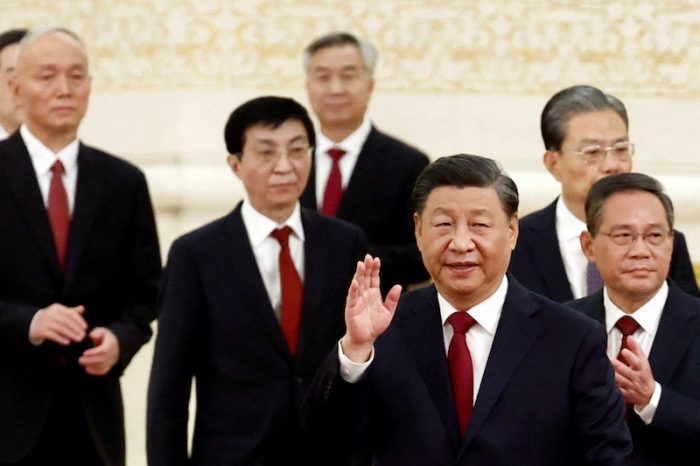Beijing has deferred plans to unveil new stimulus, despite vowing on Friday to support firms and workers hit hardest by triple-digit tariffs on Chinese goods.
The Communist Party’s top decision-making body, the Politburo, has opted to implement policies quicker rather than launch new deficit spending measures, preferring to maintain composure.
The move appears to be a bet on Washington blinking first in a protracted trade war, but is designed to maintain flexibility in a fast-changing external environment.
ALSO SEE: Trump Says ‘Xi Called’ Him, Signals Trade Deals in Coming Weeks
The decision to withhold additional stimulus disappointed investors, leading to a 3% slump in Chinese real estate stocks on Monday, despite official efforts to assuage market concerns over a sharp downturn in growth.
Beijing is already in a higher stimulus gear, which it can maintain over the coming months to mitigate the pain of losing, at least temporarily, its biggest customer, analysts and policy advisers said.
The lack of new stimulus does not point to a capitulation on its high growth ambitions this year – matching last year’s growth of around 5% – but a strategy to remain flexible amid the tariff war with President Donald Trump’s administration.
“It’s simply too early for Beijing to go all-in,” said Larry Hu, chief China economist at Macquarie.
“It’s much easier for Trump to walk back his tariff threat than it is for Beijing to walk back its stimulus announcement. Moreover, policymakers could announce new stimulus at any time.”
China has already brought forward the implementation of its 2025 stimulus plans and that will continue, Hu said.
In January-March, government spending rose 4.2% from a year earlier, while revenue fell 1.1%, resulting in a fiscal deficit of 1.26 trillion yuan ($173 billion), the highest first-quarter reading on record, government data showed.
Furthermore, local governments issued nearly 1 trillion yuan in new special bonds over that period, up nearly 60% from a year earlier. The People’s Bank of China has also escalated lending to state-backed investors to support the stock market.
Social financing peaked in March
Growth of China’s total social financing, a broad measure of credit and liquidity, hit a 10-month high of 8.4% in March, central bank data showed.
New loans to non-bank institutions hit 284.4 billion yuan in February – the second-highest reading since a peak of 886 billion yuan in July 2015, China’s last major stock market crisis. Non-bank loans fell in March but analysts expect April to be strong.
Policy advisers say more can be done if needed.
“We have policy reserves in place – various contingency plans have already been prepared,” said a policy adviser who spoke on condition of anonymity due to the topic’s sensitivity.
“The timing of new policies will depend on how big the tariff impact turns out to be.”
A second adviser said room for policy easing remained “ample,” but he added that new measures “cannot be rushed.”
“We cannot afford to lose that flexibility,” he said. “We still need to assess how the situation evolves before deciding how to proceed.”
The Politburo statement also flagged further interest rate cuts and liquidity injections, such as by reducing the amount of cash banks are required to hold as reserves, but a source close to the PBOC said the central bank was in no rush to trim as the tariffs’ ultimate impact was still unclear.
“The external environment has been changing so fast,” the source said, but added: “If the data starts to deteriorate in coming months, the central bank will certainly roll out monetary stimulus.”
Growth risks
The Trump administration struck a more conciliatory tone last week, saying the tariffs were unsustainable and signaling openness to de-escalating the trade war.
But Beijing appears to be hunkering down, denying Trump statements that negotiations are taking place, and calling on Washington to remove the tariffs.
Eurasia Group’s China director Dan Wang said that not giving ground to Trump could appease the domestic audience, but internally, Chinese officials are “fully aware of the risks” to growth.
She estimates China needs 2 trillion yuan in new stimulus to keep this year’s economic growth from falling below 4%.
Morgan Stanley analysts also expect 1 trillion yuan to 1.5 trillion yuan in new measures in the second half of the year, “which would not fully offset the tariff shocks.”
Ting Lu, chief China economist at Nomura, says announcing a new raft of stimulus now would be akin to Beijing “blinking first in the game of chicken by showing nervousness and chaos.”
Instead, China wants to “present an image that it is calm and well-prepared” for the trade war, he said.
But the risk is that of a bigger than expected shock to the economy in the near term, which would take longer – and might require greater policy efforts down the line – to recover from.
“Their approach is to watch and wait for the US to collapse slowly,” said Alicia Garcia-Herrero, chief economist for Asia Pacific at Natixis, but adding “this approach is very costly.”
- Reuters with additional editing by Jim Pollard
ALSO SEE:
Tariffs Must be Scrapped if US Truly Wants a Trade Fix: China
China Mocks Trump’s Turnaround: ‘Tariffs to Drop Substantially’
China Vows to Retaliate if Trade Deals Hurt Its Interests
Cyber Scam Hubs Spread From Asia Like a Global Cancer: UN
Vance Pushes Closer US-India Ties, Issues Curious Warning
EU Rejects US Offer to Cut Tariffs if it Pulls Away From China – IT
TransPacific Cargo Trade Decimated by Trump’s Tariff War
Trump Wants Defence Costs Part of Tariff Talks With Asian Allies
China Follows US Playbook in Rare Earth Crackdown; Tesla Hit
























